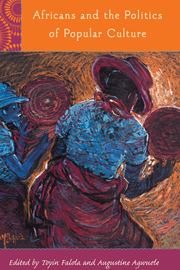Book contents
- Frontmatter
- Contents
- List of Illustrations
- Preface
- Introduction
- 1 From Primitive to Popular Culture: Why Kant Never Made It to Africa
- Part One Politics of Culture in Habitual Customs and Practices
- Part Two Politics of Culture in Popular Representations: Films and Performances
- Part Three Politics of Culture in Popular Texts
- 12 Literary Cultural Nationalists as Ambassadors across the Diaspora
- 13 Popular Resistance Literature and the Nigerian Railway Corporation, 1955–60
- List of Contributors
- Index
- Rochester Studies in African History and the Diaspora
13 - Popular Resistance Literature and the Nigerian Railway Corporation, 1955–60
from Part Three - Politics of Culture in Popular Texts
Published online by Cambridge University Press: 12 September 2012
- Frontmatter
- Contents
- List of Illustrations
- Preface
- Introduction
- 1 From Primitive to Popular Culture: Why Kant Never Made It to Africa
- Part One Politics of Culture in Habitual Customs and Practices
- Part Two Politics of Culture in Popular Representations: Films and Performances
- Part Three Politics of Culture in Popular Texts
- 12 Literary Cultural Nationalists as Ambassadors across the Diaspora
- 13 Popular Resistance Literature and the Nigerian Railway Corporation, 1955–60
- List of Contributors
- Index
- Rochester Studies in African History and the Diaspora
Summary
Introduction
The construction and management of railroads in Africa attracted many workers, not only from Africa itself but also from Europe and Asia. In the particular case of Africans, well into the postcolonial period the railroad industry was the largest employer of their labor. For example, by 1952 no fewer than 30,000 Nigerians were employed by the Nigerian Railway (NR). As a result of the important role played by rail transport in the political economy of colonial Africa, railroad workers played very prominent roles in the struggles between Africans and the colonial authorities. According to Oberst, this was because
They were the most stabilized of African workers and often developed a sense of common identity. This and their location throughout the colony facilitated the spread of strikes along the railway line from one town to the next. … the railways employed a significant number of skilled workers and this gave the workforce a degree of bargaining power necessary to strike effectively.
From this privileged position, workers were able to pressure the colonial authorities through, for instance, the use of strikes from the 1920s onward. These strikes reached a crescendo between 1945 and 1948, when there were general strikes across Africa.
There is a large body of literature on the origins, organization, leadership, causes, and impact of these strikes, and on transport workers' militancy in general.
- Type
- Chapter
- Information
- Africans and the Politics of Popular Culture , pp. 299 - 320Publisher: Boydell & BrewerPrint publication year: 2009



